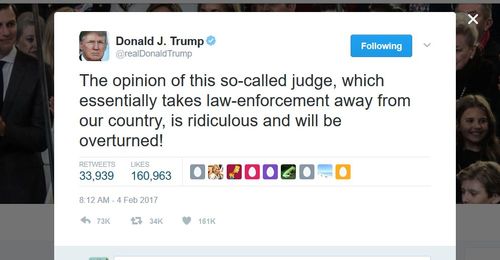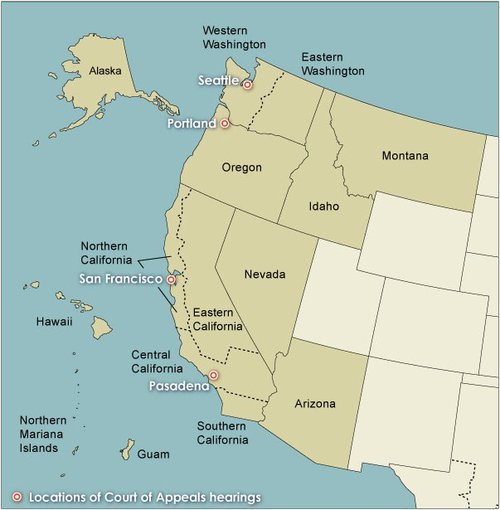


02/10/2017
[Adapted from the latest Radio Derb, now available exclusively on VDARE.com. See also Peter Brimelow On Judicial Imperialism In FORBES … THIRTY YEARS AGO!]

Especially with the mugging of Trump Administration’s immigration patriot Executive Order by the Left Coast’s No-Good Ninth Circuit, the spotlight this week has been on the third branch of the federal government: the judiciary.
First let me just get something out of the way: the thing I’m going to call the Fallacy of Judicial Impartiality.
There is a vague and widespread feeling that the other two branches of the federal government are a noisy, bloody, dirty arena of political conflict, where persons with opposing views about big issues kick and wrestle and scream at each other; while the third branch is a sort of quiet, stately, oak-paneled place where the truth is pursued by abstract intellection and rational persuasion.
That’s all nonsense. The judiciary is now just as political as the other branches. Anyone who’s paid attention to court decisions for a few years knows this. It’s implicit in every comment you've heard — and you've heard a couple of thousand such, if you're one of those who've been paying attention — that the U.S. Supreme Court contains X liberals, Y conservatives, and Z fence-sitters. (The current balance has X =4, Y = 3, Z = 1.)
At his elegant and blessedly short speech accepting nomination to the vacant Supreme Court seat ten days ago, Judge Neil Gorsuch uttered some loftily idealistic platitudes about our judges: "Following the law as they find it, and without respect to their personal political beliefs.”
He told us that: "A judge who likes every outcome he reaches is very likely a bad judge, stretching for results he prefers rather than those the law demands." [President Trump nominates Neil Gorsuch for Supreme Court, By Ariane de Vogue, CNN, February 1, 2017]
I would have been spraying bourbon out through my nose in reaction to that — but for the fact that I have long since passed right through mere cynicism to the other side; to a grim resignation as to human weakness, and a calm toleration of the ceremonial idealism with which our public figures believe they are obliged to wrap their ambition, partisanship, and occasional cupidity.
Judge Gorsuch’s platitudes are the secular equivalent of the ceremonial deism that obliges a yuppie agnostic like Barack Obama to call on God for blessings on our republic.
These are agreeable and customary forms of words, that citizens like to hear, but with little bearing on real motives and actions.
It follows that the judiciary is not, and should not be, immune from partisan barbs and rancor. It never has been. Thomas Jefferson, Andy Jackson, Abraham Lincoln, and Franklin Roosevelt have most famously shown scorn for the judicial power at some point, on some particular issue. But those are only the most famous cases.
Have we had any President, other than poor William Henry Harrison, who did not at some point deliver a kick to the groin, or at least a rap on the knuckles, to the federal judiciary?
I doubt it. That’s our system. It’s politics all the way down.
In all fairness, in fact, the federal judiciary should actually expect more vituperation than the other branches. An unsatisfactory congressman can be voted out after two years; an unsatisfactory President after four; an unsatisfactory Senator after six. But a federal judgeship is for life.

The only way to get rid of a federal judge is by getting Congress to impeach and then convict him for high crimes and misdemeanors: a cumbersome process, also of course a very political one, and furthermore one that congresscritters, presidents, and senators are also liable to.
The Ballotpedia article Impeachment of federal judges says that "Fifteen federal judges have been impeached. Of those fifteen: eight were convicted by the Senate, four were acquitted by the Senate, and three resigned before an outcome at trial."
Functionaries in the other two branches are in double jeopardy: they can be voted out of office, and they can be impeached. But federal judges are in a much safer space: they can only be impeached, and hardly ever are — we have seen fewer than four convictions per century.
It follows, according to me, that a federal judge should reasonably expect double the load of vituperation that our President and elected legislators have to endure.
It further follows that the squealing and facepalming of this past few days over President Trump’s disagreements with Judge Robart of Washington State and the Ninth Circuit Court of Appeals over his Executive Order, is just political theater.
The federal courts are not a zone of lofty intellectual purity, floating high above the dust cloud of political conflict. They are down there in the dust cloud, kicking and scratching with the rest, and working with an advantage the other combatants don’t have — lifetime tenure.
If some federal judge can’t bear the thought of a politician’s fist connecting with his teeth, he should find another line of work.

John Derbyshire writes an incredible amount on all sorts of subjects for all kinds of outlets. (This no longer includes National Review, whose editors had some kind of tantrum and fired him. ) He is the author of We Are Doomed: Reclaiming Conservative Pessimism and several other books. He’s had two books published by VDARE.com: FROM THE DISSIDENT RIGHT (also available in Kindle) and From the Dissident Right II: Essays 2013. His writings are archived at JohnDerbyshire.com.